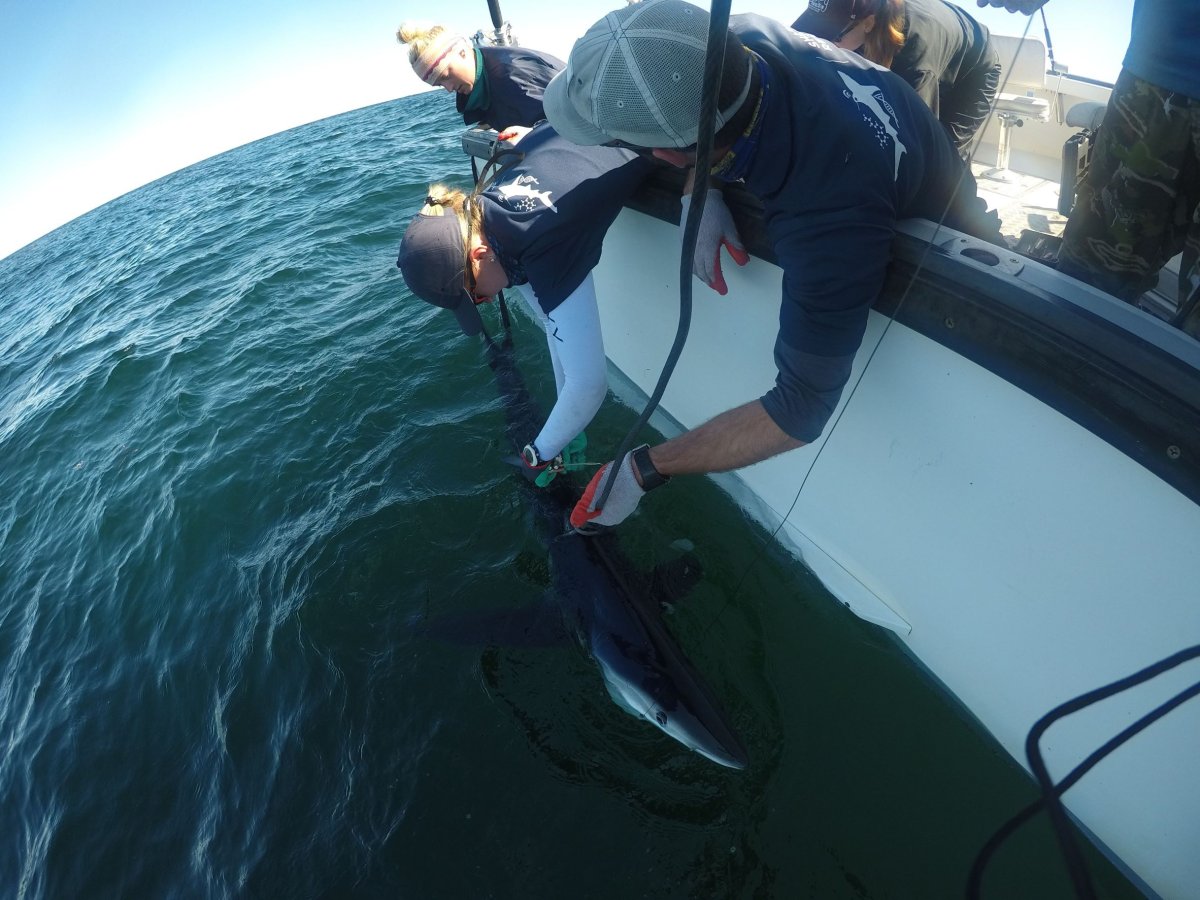Catch and release fishing appears to cause extreme stress to sharks, causing a spike in body temperature that could have devastating impacts on its physiology and behavior.
A study from Trinity College Dublin has found that short-term capture can cause a shark's internal body temperature to spike by as much as 4.8°F.
"Catch and release studies have shown that the practice can have ecological and physiological impacts to fish, but shark species are understudied in this aspect," Lucy Harding, who led the study, told Newsweek.
Catch and release fishing is a popular angling method used widely in the ecotourism industry and recreational fishing. It has also been estimated that approximately 9.1 million tonnes of non-target fish are caught and released in commercial fisheries every year.

"There is essentially no limit on catch and release shark fishing in the U.S.," Drew Chodash, a spokesperson for PETA (People for the Ethical Treatment of Animals, a non-profit animal rights group) told Newsweek.
Understanding the impact of this sport is important to developing best practices when it comes to animal welfare.
Harding's team conducted the research on Blue sharks and Tiger sharks swimming in a range of locations: the Bahamas, off the coast of Cape Cod, and around Co. Cork in Ireland.
They caught sharks using baited hooks and measured any changes in their internal body temperature. They then attached biologging devices to the animals' fins to continue recording their body temperature after they were released back into the wild.
On average, the sharks' temperature increased by 1.3 to 2.2°F, although elevations were as high as 4.8°F in some specimens. It also took the sharks up to 40 minutes to cool down after being released back into the water.

These numbers might not sound like much, but, in physiological terms, this is a huge increase. "Acute elevations of body temperature can speed up digestion rates, increase the expression of heat shock proteins, and affect biological rates, such as metabolism, potentially contributing to a deficit in the sharks' daily energy budget," Harding said.
The results are a clear indicator of the physical exertion the sharks undergo during this type of fishing.
"We think that perhaps this elevation in body temperature reflects increased aerobic exercise during the time the shark is on the hook," Harding said. "It may also be due to a mismatch between heat generated in the muscles and lost at the gills.
"When sharks are swimming, the gills can act as a surface over which heat can be transferred. When a shark is caught on a hook, they cannot swim freely and therefore may not be able to off-load the heat being generated internally, leading to an elevation of their body temperature."
The sharks that were studied are cold-blooded, which means that their body temperature tends to match that of their surroundings. This is why the spike in their internal temperature is so unusual.

Harding believes that warm-blooded animals, such as the great white shark, might exhibit even greater elevations in body temperature than their cold-blooded counterparts. A similar study done in bluefin tuna, one of the few species of fish to be classed in such as a way, supports this theory, with the animals showing an average increase of 3.6°F after being captured in nets.
"Shark populations are threatened globally," Harding said. "They face numerous impacts to their environment (including ocean warming, hypoxia and acidification) and several human-induced impacts such as pollution, habitat destruction, and fisheries interactions."
The researchers hope that their results will be used to help design less stressful handling practices for shark angling.
"Possible avenues of research could be to explore the potential benefits of avoiding removing sharks from the water (instead, leaving them submerged) or avoiding catching them in water temperatures near the upper limit of their thermal preference," Harding said.
Uncommon Knowledge
Newsweek is committed to challenging conventional wisdom and finding connections in the search for common ground.
Newsweek is committed to challenging conventional wisdom and finding connections in the search for common ground.
About the writer
Pandora Dewan is a Senior Science Reporter at Newsweek based in London, UK. Her focus is reporting on science, health ... Read more





